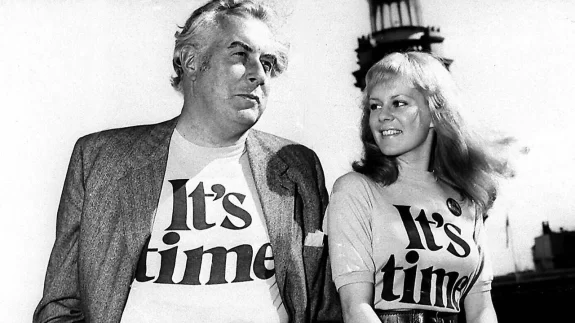We wanted Gough

So much has been said of the late Gough Whitlam since his passing this morning that I doubt there is anything new I could offer.
Carol wrote a brief article (We want Gough) a couple of years ago to celebrate his 96th birthday and to save me what might be a laborious task scratching around for those few extra elusive words, she has kindly let me reproduce it here. The words she found two years ago still fit nicely today.
Whether one agrees or disagrees with some of the initiatives of the Whitlam government, it cannot be argued that with his election as Prime Minister, Gough Whitlam brought Australia into the modern era.
When Whitlam was elected, there was a degree of staleness about the Liberal’s reign. The Menzies era had extended beyond the memories of many with subsequent Liberal Prime Ministers, Holt, McEwan, Gorton and McMahon being decidedly uninspiring. Then there was the deceit and chaos of Vietnam, and the disruption of young men’s lives with the conscription lottery.
Society was demanding a change of emphasis, post War baby boomers were looking for a far more egalitarian society. Successive Liberal governments sought to maintain the status quo, a classist system with an inward looking narrowness prevailed. God Save the Queen was our National Anthem.
The dynamism of Whitlam’s “It’s Time” election campaign was a reflection of a society changing, the entering of an era where politics was the realm of everyman.
Whitlam’s list of achievements during the short term of his Prime Ministership include:
- 1972: ended conscription during Vietnam War.
- 1973: created new government departments including Aboriginal Affairs, Environment and amalgamation of armed forces into Defence.
- 1974: Aboriginal Land Fund Commission, Australian Legal Aid Office, National Employment and Training Scheme.
- The Health Insurance Act 1973 established ‘Medibank’, a national health scheme funded by levy which provided free public hospital treatment and medical benefits totaling at least 85 per cent of the cost of doctor and hospital services.
- The Trade Practices Act 1974 outlawed restrictive trade practices and ensured consumer protection and product and manufacturing liability.
- The National Parks and Wildlife Conservation Act 1975 established a service to plan and manage national parks in line with international standards.
- The Racial Discrimination Act 1975 enabled Australia to ratify the International Convention on the Elimination of all Forms of Discrimination.
- The Family Law Act 1975 replaced the existing grounds for divorce with a single ground, irretrievable breakdown of marriage (for example, having separated and lived apart for 12 months or more) and the extension of federal jurisdiction to maintenance, custody and property matters.
(A more detailed list of his achievements can be found in today’s article by John Lord).
No article on Gough would be complete without a mention of Margaret. Her influence on how many women perceived their roles in society is quite profound. This is giving due regard to the fact that prior to Margaret, the role of the partner of a Prime Minister was either tea and scones on the lawn, or as an attractive accessory.
“He admired her intellect, wit and commitment to improving the lives of others; she described him as ‘delicious’ and ensured his feet remained well-grounded.”
For myself, this era brings memories of the Draft, the Moratorium, and the anti-racism rallies (most especially around the Springbok tour). It was the beginning of a new Australian nationalism (which embraced multiculturalism), the fostering of the arts, the belief in a new society where irrespective of class, that all should have opportunities to succeed.
Like what we do at The AIMN?
You’ll like it even more knowing that your donation will help us to keep up the good fight.
Chuck in a few bucks and see just how far it goes!
Your contribution to help with the running costs of this site will be gratefully accepted.
You can donate through PayPal or credit card via the button below, or donate via bank transfer: BSB: 062500; A/c no: 10495969









